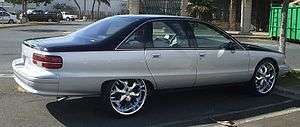Hi-Riser
Hi-Risers are a type of highly customized automobile, typically a traditional, full-size, body on frame, V8 powered, rear wheel drive American-built sedan modified by significantly increasing the ground clearance and adding large-diameter wheels[1] with low-profile tires. Depending on the model and style of body, autos customized in this manner can be labeled "donk," "box," or "bubble."[2]

Overview
Hi-risers, sometimes known as Quan-cars, originally grew out of the Dirty South subculture, but the trend has spread across the United States. Vehicles customized in the hi-riser style are distinguished by their over-sized (even disproportionate) wheels, ranging from 20 inches to 30 inches or more in diameter (largest being 50 inch), as well as fanciful custom paint-jobs and expensive audio equipment. Suspension modifications similar to those employed on lifted pickup trucks are made to give adequate clearance for the large wheels. Often the suspension is modified so the front end sits slightly higher than the rear end, giving the car a swaggering appearance. Because of the exaggerated look gained from installing a lifted suspension and enormous wheels, donks are also known as "hi-risers" or "sky-scrapers."
The most popular vehicles for these types of modifications are late 20th century, full-size, rear wheel drive sedans and coupes manufactured by General Motors (Chevrolet, Oldsmobile, Buick, and Cadillac), namely the Impala, Caprice,[3] Buick Roadmaster, Oldsmobile 98, and Cadillac Fleetwood/Fleetwood Brougham/Brougham, as well as mid-sized models such as the Chevrolet Monte Carlo, Buick Century, and Oldsmobile Cutlass Supreme. However, similar full-size Ford models (Crown Victoria, Lincoln Town Car, Mercury Grand Marquis) are also popular, largely due to the ability to cheaply buy former police service Crown Victorias. There are three main sub-types of hi-riser, although the distinctions are blurred and open to debate. Most hi-riser enthusiasts agree that a "donk" traditionally is a 1971 to 1976 Impala. They were given this name because the "Impala" logo was referred to as a "donkey" by owners, or "donk" for short.[2] To complement the sloping rear, the suspension of donks are frequently higher in the front end than the rear, resulting in a nose-up stance. Other hi-risers are usually raised evenly, resulting in a more or less level stance. A box is another sub-type of hi-riser, usually a 1977-1990 malaise-era Impala or Caprice with a boxy or squared-off front and rear end. Other malaise-era models that are frequently made into hi-risers include the G-body Buick Regal, Oldsmobile Cutlass,[4] Chevrolet El Camino, Pontiac Grand Prix, and Pontiac Bonneville.
Other vehicles gaining in popularity as hi-risers are the Cadillac DeVille and Seville, as well as the Buick Roadmaster. Also gaining in popularity are the Ford Crown Victoria, Mercury Grand Marquis, and Lincoln Town Car sedans. These three are the last full sized, body-on-frame, RWD sedans of which the Lincoln Town Car, the last one of the three to still be in production, ended a 31-model-year run in 2011. In fact, the Grand Marquis in particular is enjoying a slight sales surge due to the increasing popularity of buying them new and turning them into hi-risers. Several rappers have alluded to the Grand Marquis in their music, such as Dorrough's "Ice Cream Paint Job": "Grand Marquis, paint job grape jelly."
Music style and slang
Hi-risers are an integral part of Indianapolis, St. Louis, the East Coast, Central and Miami music scene. Donk riders and rappers from this area in particular also share unique styles of slang and clothing. In South Florida, drivers of cars that would otherwise be considered classic and have had their stock tires replaced with 24s,[5] are referred to as donk riders.[6] (The expression is thought to have originated with rapper Trick Daddy, who hails from the Miami neighborhood of Liberty City.) One prominent donk rider style in the South Florida area pairs dreadheads with gold teeth or a gold grill, and over the years has spread throughout Florida.
Technical challenges
Raising a vehicle off of the ground by such a degree raises the center of mass to a point where rolling the vehicle becomes a distinct possibility. The suspension modifications required are often meant for trucks and larger vehicles (unless specialized). If the vehicle's brakes have not been upgraded to compensate for the significant increase in wheel diameter, its braking ability will be greatly diminished. In turning too fast, the weight of the vehicle may shift to extremes that were never considered for the vehicle in question, and may cause loss of traction or damage to the vehicle itself. If not done the right way by a skilled technician, a wheel could come off while driving, resulting in significant damage to anything it hits. If done properly, it should handle in a similar fashion to a lifted truck or SUV.[7]
See also
- camp (style)
- Dub (wheel)
- Ghetto
- Lowriders (contrast with)
- Scraper (car)
- Southern rap
References
- Diaz, Johnny (18 April 2017). "Video: Donks are everywhere in South Florida". Capital Gazette. Retrieved 9 January 2020.
- "This 20-minute video of donks, boxes and bubbles is oddly hypnotizing". Autoweek. 26 August 2016. Retrieved 9 January 2020.
- Ariza, Mario (28 November 2019). "Miami rapper Trick Daddy's donk goes up in smoke". sun-sentinel.com. Retrieved 9 January 2020.
- DieCastX Magazine. Air Age. p. 63. Retrieved 9 January 2020.
- "Donk Box & Bubble Cars". Rides Magazine. Retrieved 2006-11-04.
- "Donk Box & Bubble Documentary". Rides Magazine. Retrieved 2006-11-04.
- "Donk Daytons take out uber-clean M3, we weep silently". Autoblog.